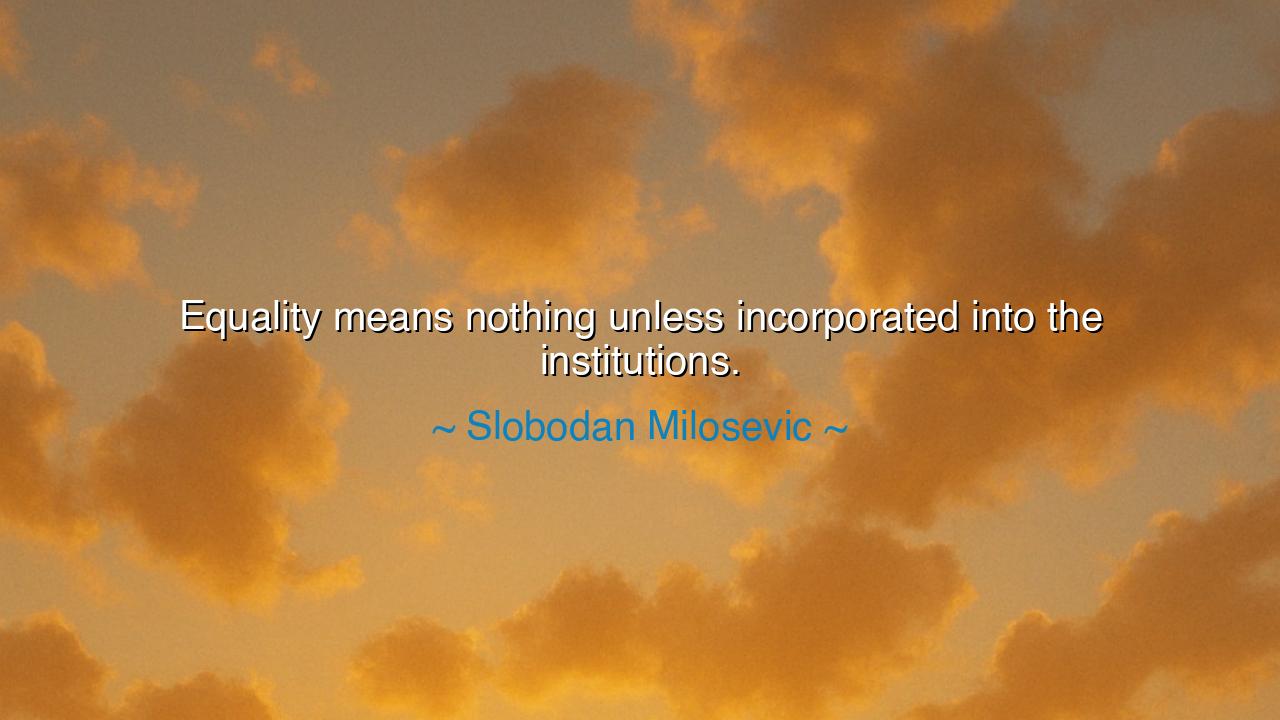
Equality means nothing unless incorporated into the institutions.






When Slobodan Milosevic declared, “Equality means nothing unless incorporated into the institutions,” he touched upon a truth that transcends time and nations: that ideals, no matter how noble, wither into emptiness unless they are rooted in the very structures that govern society. Words of freedom, speeches of justice, proclamations of equality—these are but whispers on the wind if they are not enshrined in laws, courts, schools, and parliaments. It is in the bones of institutions that ideals either live or die.
The meaning of this quote is clear and urgent. Equality is not a sentiment, nor a fleeting wish, but a principle that must be carried into the machinery of power. If governments speak of equality yet allow discrimination in their laws, then their words are lies. If schools teach children to honor fairness but do not treat all with dignity, then their lessons are hollow. Only when the principle of equality is written into the rules of governance, into the systems of justice, into the policies of nations, does it cease to be an illusion and become a lived reality.
The origin of these words arises from Milosevic’s time in the turbulent late twentieth century, when Yugoslavia was riven by conflict, identity, and division. He himself would later betray the very spirit of equality by stoking nationalism and favoring one group over another. Yet even in his contradiction, the truth of his statement remains. For the collapse of Yugoslavia was born precisely because institutions failed to protect equality among its diverse peoples. The lesson of history is sharp: when equality is not safeguarded in the structures of law and government, society fractures, and chaos takes its place.
History provides us with examples both triumphant and tragic. In the United States, the Civil Rights Movement achieved a great moral victory not merely because hearts were stirred, but because institutions were changed. The Civil Rights Act of 1964 and the Voting Rights Act of 1965 took the dream of equality and carved it into law, ensuring that the rights of African Americans could no longer be denied by custom or prejudice alone. Without these institutional changes, equality would have remained an unfulfilled promise. By contrast, consider the French Revolution: though it declared liberty, equality, fraternity, its institutions were weak and unstable, and thus its promise was drowned in violence and tyranny.
The wisdom of Milosevic’s words is that we must be wary of empty rhetoric. Leaders may speak of equality while enacting policies that destroy it. Nations may proclaim fairness while building institutions that oppress. Ideals must not only be proclaimed—they must be embedded. For laws and structures outlive speeches, and it is they that shape the daily lives of people for generations to come. Institutions are the vessels of justice, and without them, justice leaks away.
The lesson is plain: if you desire a just society, do not settle for words alone. Demand that equality be written into constitutions, protected by courts, defended in parliaments, and taught in schools. Equality must be practiced in hiring policies, in access to health and education, in the rights of men and women, majority and minority alike. Without such embodiment, it remains a dream deferred, fragile and easily broken.
What then must the listener do? In your own time, scrutinize the institutions around you. Do not be lulled by declarations of fairness—ask how equality is enforced. If you are a leader, carve equality into the laws you pass. If you are a citizen, hold your institutions accountable, demand reform where injustice lingers, and support those who weave fairness into the fabric of society. For equality is not a gift bestowed from above; it is a structure built by the hands of many.
Remember always: equality means nothing unless incorporated into the institutions. Ideals die without embodiment; justice crumbles without guardians. Let us be the builders who do not merely speak of fairness, but who enshrine it in laws, uphold it in courts, and protect it in schools and governments. Only then will equality be more than a word—it will be the living foundation upon which nations endure.






AAdministratorAdministrator
Welcome, honored guests. Please leave a comment, we will respond soon